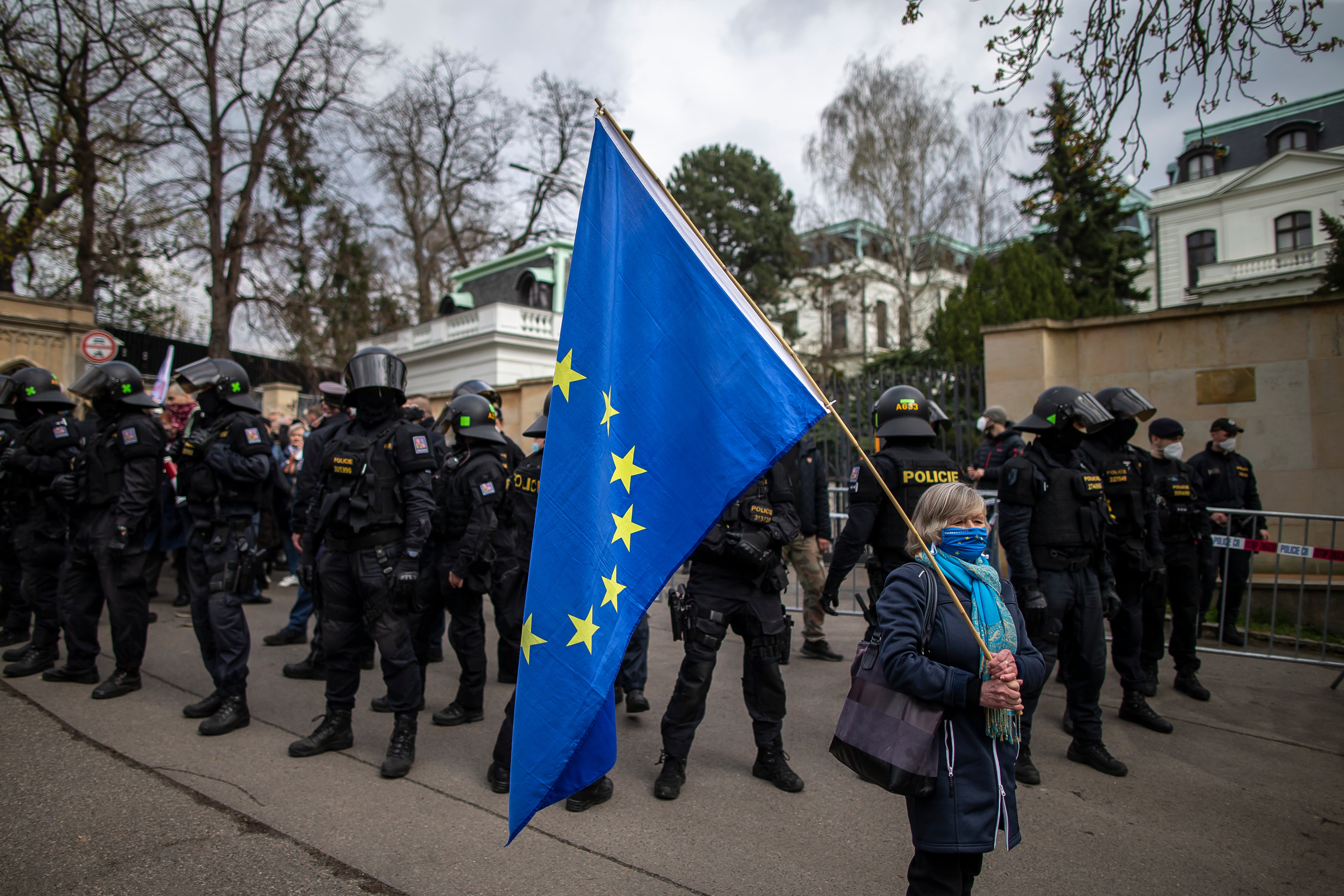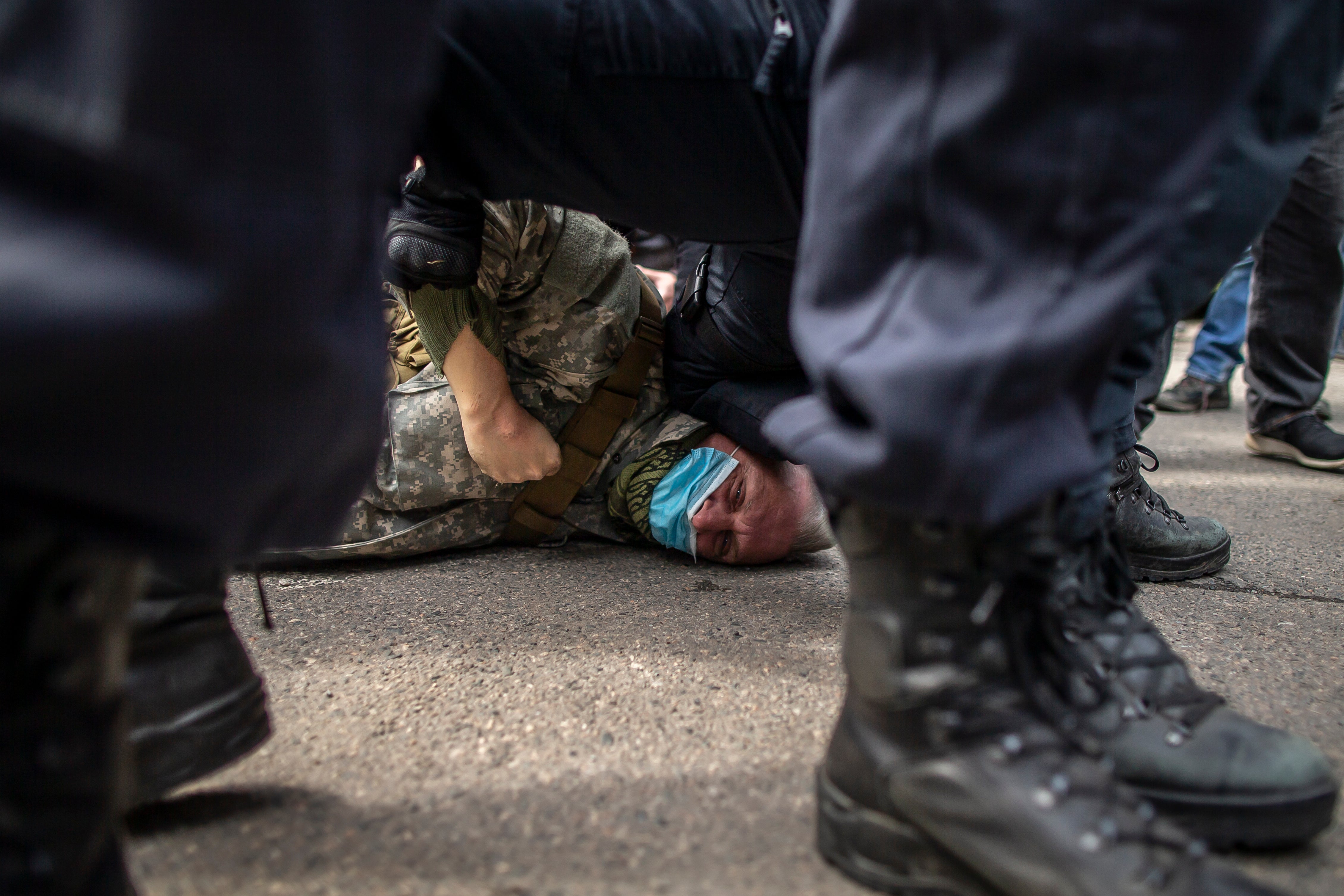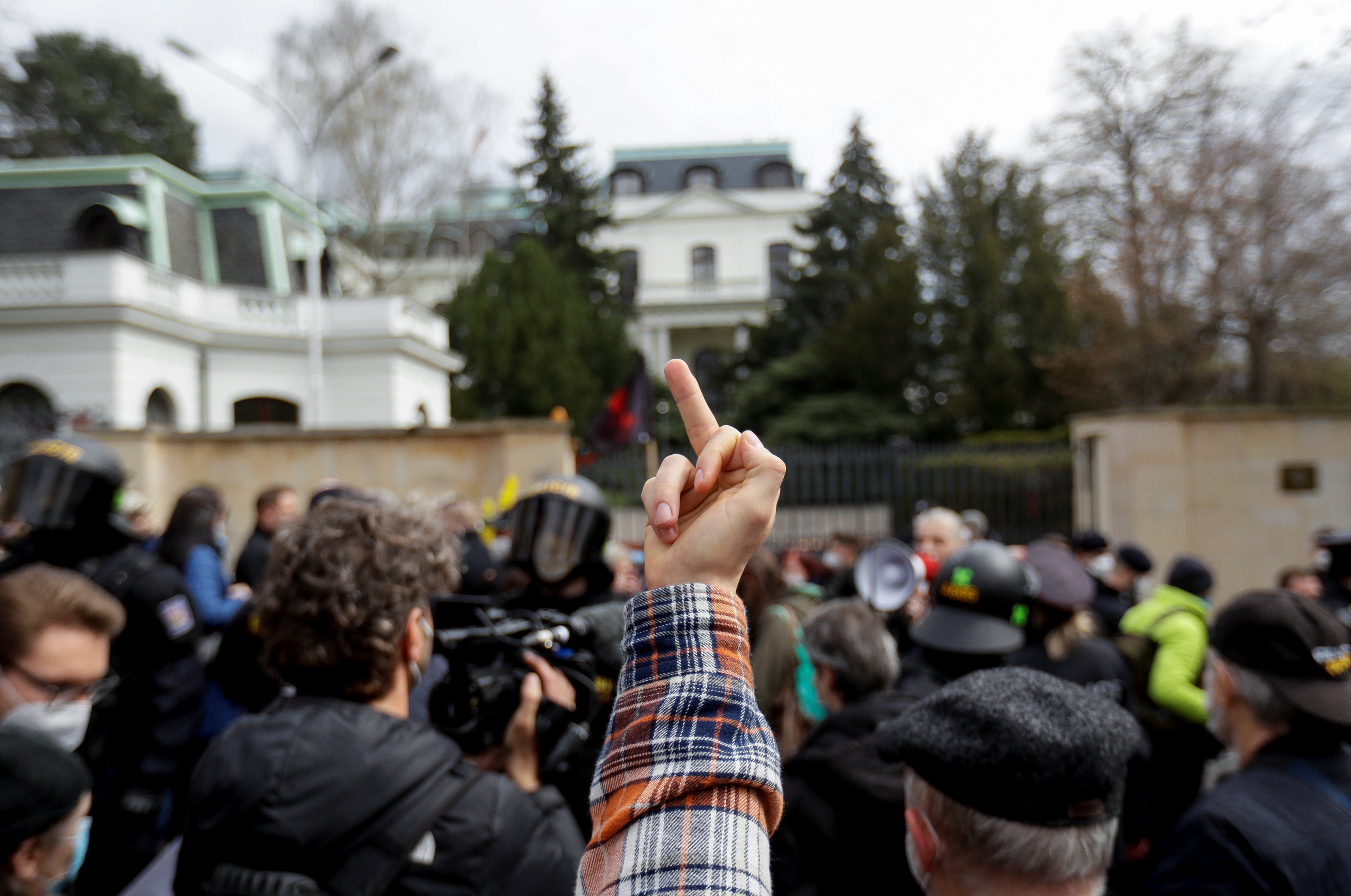East or west: Czech spy row with Russia reveals Prague’s battle for the political soul of a nation
The row between Prague and Moscow has seen almost 40 diplomats expelled from both countries and exposed a deep political conflict in the Czech Republic, reports William Nattrass in Prague

On Monday night, Prague Castle blazed neon-blue as the words “High Treason” were projected onto the walls. The stunt took aim at the Czech president, Milos Zeman, who, in the light of a diplomatic crisis with Russia, has come to embody a battle for the political soul of the Czech Republic.
On Saturday, Czech prime minister Andrej Babis held an emergency press conference to announce “unequivocal evidence” pointing to the involvement of Russian secret agents in a huge explosion which killed two workers at an arms depot near the Moravian village of Vrbetice in 2014.
It has been speculated that the armaments destroyed in the explosion were bound for Ukraine and for rebel forces in Syria. The two agents accused of carrying out the attack – Alexandr Miskin and Anatolij Cepigov – are the same GRU operatives blamed for the Salisbury poisoning in the UK four years later.
Opposition politicians – joined, somewhat reluctantly, by Babis himself – described the explosion as an act of “state terrorism”. Eighteen Russian diplomats were given 48 hours to leave the country, and Russia wasted no time in responding with the expulsion of 20 diplomats from the Czech embassy in Moscow. The Czech government on Thursday heightened tensions still further, announcing the expulsion of 63 more staff from the Russian Embassy in Prague.
While bringing about a drastic deterioration in Czech-Russian relations, the incident has brought into focus a deep internal conflict on allegiances between east and west in the Czech Republic.
Eastern and western influences have vied for dominance here since the fall of communism in 1989.
The first leaders of the independent Czech Republic took the country into Nato and the EU, as the memory of Soviet tanks invading the country in 1968 remained fresh. Yet since the election of Eurosceptic, pro-Russia President Zeman in 2013, Czech foreign policy has seen a notable shift away from western allies.
“The Czech Republic is a member of Nato and the EU, but President Zeman and his team have pulled the country to the east,” says Jiri Pehe, a former Czech political cabinet member and current director of the New York University in Prague. “Zeman has advocated Russian participation in major projects, such as the building of new reactors in the Dukovany nuclear power plant, and he has repeatedly spoken out to oppose western sanctions against Russia.”
The €6bn (£5.25bn) tender for a nuclear development project at Dukovany was predicted to be the focus of major geopolitical manoeuvering, with western bidders competing against companies from China and Russia. Zeman was known to favour the bid of Russian company Rosatam – but in the wake of this week’s events, the company has now been excluded from the selection process.

Meanwhile, any potential deal for buying the Sputnik V vaccine seems a political impossibility. Interior minister Jan Hamacek, who, before the Vrbetice revelations, had been due to fly to Moscow to discuss the vaccine, says the Russian jab is no longer on the table.
The Czech minister of health remains reluctant to rule out Sputnik – but it is hard to imagine a boost of “vaccine diplomacy” being administered to the Kremlin while Russian diplomats are being expelled from the country.
From energy to vaccines, the geopolitical allegiances of the Czech Republic have suddenly shifted.“The announcement that Russia was behind the blast in Vrbetice will significantly weaken the president’s position and move the country closer to the west,” Pehe says.
Zeman has so far refused to speak publicly about the affair, and his silence speaks volumes.
The president has long downplayed the threat of covert operations in the Czech Republic, and as a result he is now being portrayed as a facilitator of hostile activity on Czech soil. Opposition politicians are even calling him the “agent of an enemy power”.
Such reactions are symptomatic of a growing sense that friendly relations with Russia are at odds with the Czech Republic’s membership of the EU and Nato. A hardline stance on any kind of Russian presence in the country is taking hold – in line with a fear that the true extent of the Russian security threat has only now been made plain.
The dismissal of diplomats known to be linked to Russian foreign intelligence appears to confirm long-held suspicions that the embassy in Prague acts as a hub for covert operations. As Pehe says: “The Russian embassy is oversized for a country as small as the Czech Republic, and experts have repeatedly warned that many of its members are involved in intelligence activities.”
Countries throughout the region have meanwhile invested heavily in their armed forces since Russia’s annexation of Crimea in 2014, and experts claim the Vrbetice explosion proves the potential for physical attacks from Russia, in addition to disinformation campaigns and cyberattacks.

“The blast caused such a tremendous amount of material damage that any illusion about the non-kinetic nature of Russian warfare has been dispelled,” says Dr Matus Halas, head of the Security Centre at the Institute of International Relations in Prague.
“In many ways, this is the most important implication of the incident – as much as the speculated violation of Czech national sovereignty.”
With the physical reality of the Russian threat exposed, attempts to compete with the west for economic and political influence in the Czech Republic have taken on a menacing new complexion.
In recent months, the Czech Republic has seemed a political battleground between east and west. Yet the mask of Russian goodwill has slipped, and now, in the fight for the nation’s political soul, the west is winning.
Join our commenting forum
Join thought-provoking conversations, follow other Independent readers and see their replies
Comments